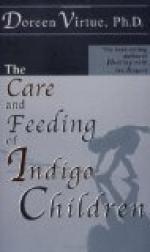From a rich Jersey milk (containing 5—5-1/2 per cent fat) by removing the upper sixteen ounces, or one half.
How can we obtain a 7-per-cent top-milk with the different kinds of cow’s milk?
From a rather poor milk, by removing the upper eleven ounces from a quart, about one third.
From a good average milk, by removing the upper sixteen ounces, or one half.
From a rich Jersey milk, by removing the upper twenty-two ounces, or about two thirds.
[Illustration: The percentage of fat in the different layers of milk of good average quality.]
What is cream?
Cream is often spoken of as if it were the fat in milk. It is really the part of the milk which contains most of the fat. It differs from milk chiefly in containing much more fat.
In what ways is cream now obtained?
(1) By skimming, after the milk has stood usually for twenty-four hours? this is known as “gravity cream.” (2) By an apparatus known as a separator; this is known as “centrifugal cream”; most of the cream now sold in cities is of this kind. The richness of any cream is indicated by the amount of fat it contains.
The usual gravity cream sold has from 16 to 20 per cent fat. The cream removed from the upper part (one fifth) of a bottle of milk has about 16 per cent fat. The usual centrifugal cream has 18 to 20 per cent fat. The heavy centrifugal cream has 35 to 40 per cent fat.
FOOD FOR HEALTHY INFANTS[3]—THE EARLY MONTHS
[3] The directions and formulas given in the following pages are intended only for guidance in feeding children who are not suffering from any special disturbance of digestion; directions for such conditions are given in a later chapter.
What are the most important points to be remembered in modifying cow’s milk for feeding during the early months?
That of the different ingredients of milk the sugar is most easily digested; the fat is next; while the proteids are the most difficult.
What relation should the fat bear to the proteids during this period?
For most infants with good digestion the best results are obtained when the fat is three times the proteids. However, this is not true of all. There are many healthy infants who are unable to digest this proportion of fat, and who do much better when the fat is made only twice the proteids.
How can one obtain formulas in which the fat is three times the proteids?
By using for dilution a 10-per-cent milk (i.e., milk containing 10 per cent fat) which serves as the primary formula from which all the other formulas of this series are derived.
In 10-per-cent milk the fat is just three times the proteids.
How can one get the 10-per-cent milk?
(1) As top-milk, as described on page 64; or, (2) by mixing equal parts of plain milk and ordinary cream (containing about 16 per cent fat); (3) from any of the milk laboratories it may be ordered directly.




